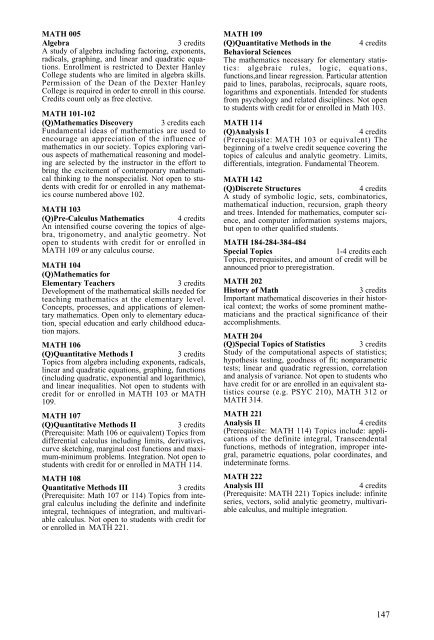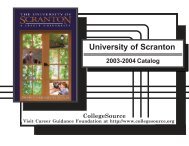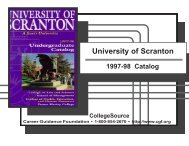You also want an ePaper? Increase the reach of your titles
YUMPU automatically turns print PDFs into web optimized ePapers that Google loves.
MATH 005<br />
Algebra 3 credits<br />
A study <strong>of</strong> algebra including factoring, exponents,<br />
radicals, graphing, and linear and quadratic equations.<br />
Enrollment is restricted to Dexter Hanley<br />
College students who are limited in algebra skills.<br />
Permission <strong>of</strong> the Dean <strong>of</strong> the Dexter Hanley<br />
College is required in order to enroll in this course.<br />
Credits count only as free elective.<br />
MATH 101-102<br />
(Q)Mathematics Discovery 3 credits each<br />
Fundamental ideas <strong>of</strong> mathematics are used to<br />
encourage an appreciation <strong>of</strong> the influence <strong>of</strong><br />
mathematics in our society. Topics exploring various<br />
aspects <strong>of</strong> mathematical reasoning and modeling<br />
are selected by the instructor in the effort to<br />
bring the excitement <strong>of</strong> contemporary mathematical<br />
thinking to the nonspecialist. Not open to students<br />
with credit for or enrolled in any mathematics<br />
course numbered above 102.<br />
MATH 103<br />
(Q)Pre-Calculus Mathematics 4 credits<br />
An intensified course covering the topics <strong>of</strong> algebra,<br />
trigonometry, and analytic geometry. Not<br />
open to students with credit for or enrolled in<br />
MATH 109 or any calculus course.<br />
MATH 104<br />
(Q)Mathematics for<br />
Elementary Teachers 3 credits<br />
Development <strong>of</strong> the mathematical skills needed for<br />
teaching mathematics at the elementary level.<br />
Concepts, processes, and applications <strong>of</strong> elementary<br />
mathematics. Open only to elementary education,<br />
special education and early childhood education<br />
majors.<br />
MATH 106<br />
(Q)Quantitative Methods I 3 credits<br />
Topics from algebra including exponents, radicals,<br />
linear and quadratic equations, graphing, functions<br />
(including quadratic, exponential and logarithmic),<br />
and linear inequalities. Not open to students with<br />
credit for or enrolled in MATH 103 or MATH<br />
109.<br />
MATH 107<br />
(Q)Quantitative Methods II 3 credits<br />
(Prerequisite: Math 106 or equivalent) Topics from<br />
differential calculus including limits, derivatives,<br />
curve sketching, marginal cost functions and maximum-minimum<br />
problems. Integration. Not open to<br />
students with credit for or enrolled in MATH 114.<br />
MATH 108<br />
Quantitative Methods III 3 credits<br />
(Prerequisite: Math 107 or 114) Topics from integral<br />
calculus including the definite and indefinite<br />
integral, techniques <strong>of</strong> integration, and multivariable<br />
calculus. Not open to students with credit for<br />
or enrolled in MATH 221.<br />
MATH 109<br />
(Q)Quantitative Methods in the 4 credits<br />
Behavioral Sciences<br />
<strong>The</strong> mathematics necessary for elementary statistics:<br />
algebraic rules, logic, equations,<br />
functions,and linear regression. Particular attention<br />
paid to lines, parabolas, reciprocals, square roots,<br />
logarithms and exponentials. Intended for students<br />
from psychology and related disciplines. Not open<br />
to students with credit for or enrolled in Math 103.<br />
MATH 114<br />
(Q)Analysis I 4 credits<br />
(Prerequisite: MATH 103 or equivalent) <strong>The</strong><br />
beginning <strong>of</strong> a twelve credit sequence covering the<br />
topics <strong>of</strong> calculus and analytic geometry. Limits,<br />
differentials, integration. Fundamental <strong>The</strong>orem.<br />
MATH 142<br />
(Q)Discrete Structures 4 credits<br />
A study <strong>of</strong> symbolic logic, sets, combinatorics,<br />
mathematical induction, recursion, graph theory<br />
and trees. Intended for mathematics, computer science,<br />
and computer information systems majors,<br />
but open to other qualified students.<br />
MATH 184-284-384-484<br />
Special Topics 1-4 credits each<br />
Topics, prerequisites, and amount <strong>of</strong> credit will be<br />
announced prior to preregistration.<br />
MATH 202<br />
History <strong>of</strong> Math 3 credits<br />
Important mathematical discoveries in their historical<br />
context; the works <strong>of</strong> some prominent mathematicians<br />
and the practical significance <strong>of</strong> their<br />
accomplishments.<br />
MATH 204<br />
(Q)Special Topics <strong>of</strong> Statistics 3 credits<br />
Study <strong>of</strong> the computational aspects <strong>of</strong> statistics;<br />
hypothesis testing, goodness <strong>of</strong> fit; nonparametric<br />
tests; linear and quadratic regression, correlation<br />
and analysis <strong>of</strong> variance. Not open to students who<br />
have credit for or are enrolled in an equivalent statistics<br />
course (e.g. PSYC 210), MATH 312 or<br />
MATH 314.<br />
MATH 221<br />
Analysis II 4 credits<br />
(Prerequisite: MATH 114) Topics include: applications<br />
<strong>of</strong> the definite integral, Transcendental<br />
functions, methods <strong>of</strong> integration, improper integral,<br />
parametric equations, polar coordinates, and<br />
indeterminate forms.<br />
MATH 222<br />
Analysis III 4 credits<br />
(Prerequisite: MATH 221) Topics include: infinite<br />
series, vectors, solid analytic geometry, multivariable<br />
calculus, and multiple integration.<br />
147
















